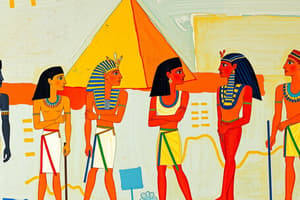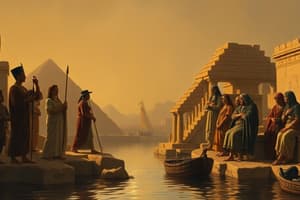Podcast
Questions and Answers
Who were the members of the ruling class in Ancient Egypt?
Who were the members of the ruling class in Ancient Egypt?
- Priests
- Farmers
- Pharaoh (correct)
- Nobles
What jobs did the upper class perform?
What jobs did the upper class perform?
Government officials and supervisors who performed ceremonies.
Who made up the middle class in Ancient Egypt?
Who made up the middle class in Ancient Egypt?
Scribes, traders, artisans, shopkeepers.
What types of jobs did the lower class perform?
What types of jobs did the lower class perform?
Why did ancient Egyptian farmers and workers build tombs for their leaders?
Why did ancient Egyptian farmers and workers build tombs for their leaders?
Why was it important to protect the bodies of the pharaohs?
Why was it important to protect the bodies of the pharaohs?
What material were the tools used to cut stone made from?
What material were the tools used to cut stone made from?
Where did workers find the stone that made up the pyramids?
Where did workers find the stone that made up the pyramids?
Why did Egyptians need to understand astronomy to build a pyramid?
Why did Egyptians need to understand astronomy to build a pyramid?
What mathematical development helped Egyptians with calculations for pyramid construction?
What mathematical development helped Egyptians with calculations for pyramid construction?
What are the benefits of the Nile River?
What are the benefits of the Nile River?
Match the following gods with their associations:
Match the following gods with their associations:
Where did all people hope to go after their death?
Where did all people hope to go after their death?
They believed that only the _______ could go to the afterlife.
They believed that only the _______ could go to the afterlife.
What is embalming?
What is embalming?
Flashcards are hidden until you start studying
Study Notes
Social Classes in Ancient Egypt
- Ruling Class: Comprised of the pharaoh, responsible for governing the kingdom.
- Upper Class: Included priests and nobles, who served as government officials and supervised ceremonies.
- Middle Class: Consisted of scribes, traders, artisans, and shopkeepers; held skilled jobs and owned businesses.
- Lower Class: Made up of farmers, herders, and unskilled workers (including slaves); jobs included unloading cargo, transporting goods to markets, and some were fishermen.
Tomb Construction
- Ancient Egyptian farmers, engineers, and stone-cutters built tombs to honor pharaohs and protect them from floods, wild animals, and robbers.
- Protecting the bodies of pharaohs was deemed important to preserve their personal belongings.
Tools and Materials
- Tools used for cutting stone were crafted from copper.
- Workers sourced stone for pyramids primarily from the Nile River Valley in Upper Egypt.
Astronomy and Mathematics
- Egyptians studied astronomy to create a 365-day calendar, essential for pyramid construction and agricultural activities.
- They developed a written numeral system based on ten, which included fractions to facilitate calculations for building projects.
Importance of the Nile
- The Nile provided vital resources: drinking water, irrigation for crops, and bathing facilities.
- It served as a trade route, enabling travel along its banks.
- Natural protections included cataracts (fast-moving waters) and surrounding mountains.
Egyptian Deities
- Key gods included:
- Ra: deity of the sun.
- Hapi: river god.
- Thoth: god of learning.
- Anubis: god of the afterlife.
- Osiris: co-ruler of the underworld.
Afterlife Beliefs
- It was believed that all people could attain the afterlife.
- However, only pharaohs were thought to be guaranteed entry into this realm.
Embalming Process
- Embalming involved preserving intestines to prevent decay, a crucial step in preparing the deceased for the afterlife.
Studying That Suits You
Use AI to generate personalized quizzes and flashcards to suit your learning preferences.




